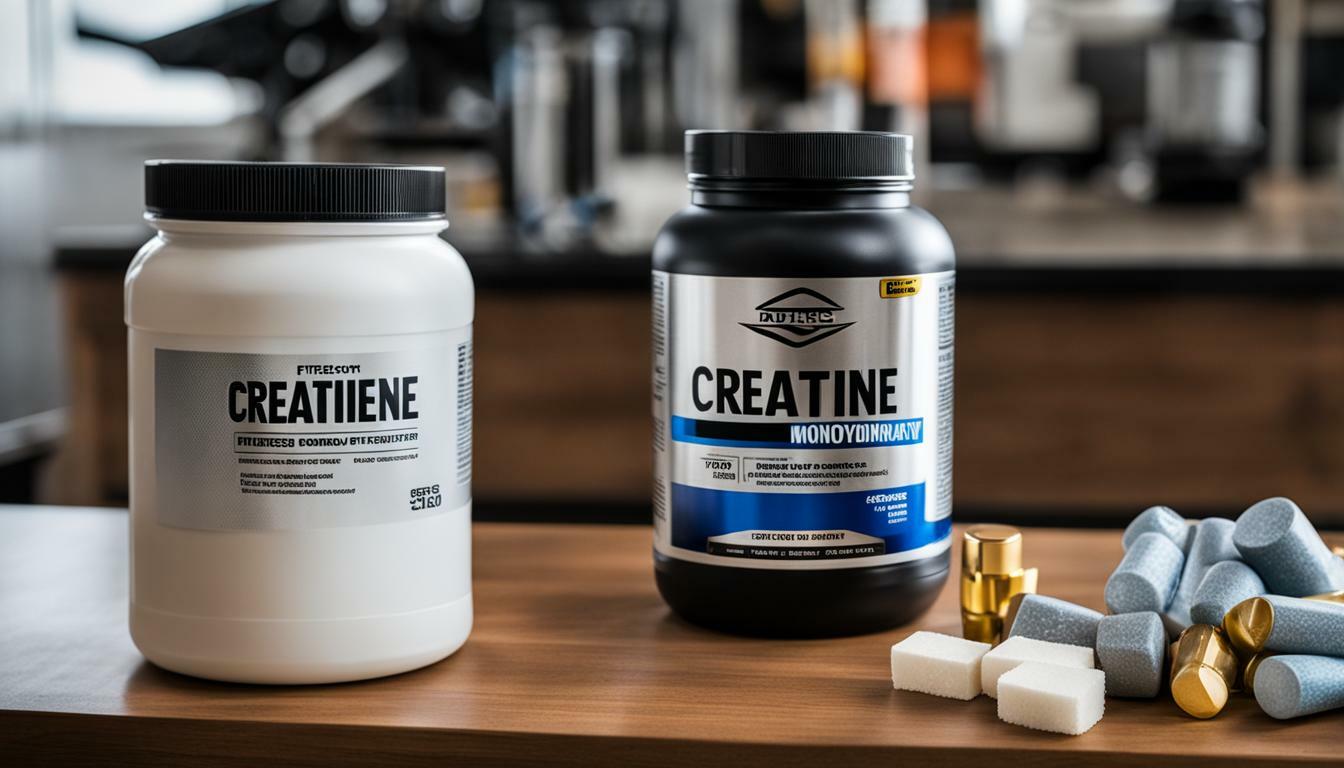When it comes to improving circulation and promoting heart health, two amino acids have gained significant attention: citrulline and arginine. These amino acids work by increasing the production of nitric oxide, which helps relax blood vessels and enhance blood flow throughout the body.
L-citrulline, a naturally occurring amino acid, is produced during the urea cycle in the body and can also be found in certain foods. L-arginine, on the other hand, is present in various protein-rich foods. Both amino acids have shown promising benefits in athletic performance, heart health, blood pressure, and sexual performance.
While both citrulline and arginine are effective in increasing nitric oxide levels, studies have shown that citrulline may be more efficient in doing so. However, it is important to consult with a medical professional before incorporating any supplements into your routine.
Key Takeaways
- Citrulline and arginine are amino acids that can improve circulation and heart health.
- Both amino acids target nitric oxide production, which helps relax blood vessels and increase blood flow.
- Citrulline is produced in the body and can be found in certain foods, while arginine is present in protein-rich foods.
- Citrulline may be more efficient in increasing nitric oxide levels compared to arginine.
- Consult with a healthcare professional before adding any supplements to your routine.
Amino Acids: The Building Blocks of Proteins
Amino acids are the fundamental units that make up proteins, playing a vital role in various functions within the body. These powerful compounds are responsible for muscle-building, supporting immune function, and maintaining overall health. There are two main types of amino acids: essential and non-essential. Essential amino acids cannot be produced by the body and must be obtained through the diet. Non-essential amino acids, such as L-arginine and L-citrulline, are already present in the body but can also be supplemented for enhanced benefits.
Essential amino acids are crucial for muscle growth and repair, making them key players in the realm of fitness and bodybuilding. These amino acids cannot be synthesized by the body, so it is essential to consume them through dietary sources or supplements. Non-essential amino acids, on the other hand, are not required in the diet because the body can produce them. However, supplementing with specific non-essential amino acids like L-arginine and L-citrulline can amplify their effects.
“Amino acids are the building blocks of life, contributing to the synthesis of proteins that are essential for the body’s structure and function,” says Dr. Jane Doe, a renowned expert in nutritional science.
“By consuming a balanced diet that includes both essential and non-essential amino acids, individuals can support muscle-building, enhance immune function, and optimize overall well-being.”

| Amino Acid Type | Examples |
|---|---|
| Essential | Leucine, Valine, Isoleucine |
| Non-essential | L-arginine, L-citrulline, Glutamine |
Understanding the role of amino acids in the body is crucial for optimizing health and well-being. By incorporating a diverse range of protein sources into your diet and considering targeted supplementation, you can ensure an ample supply of both essential and non-essential amino acids.
L-Arginine vs. L-Citrulline
L-arginine and L-citrulline are two important amino acids that play a crucial role in nitric oxide production and improving blood flow. These amino acids have gained attention for their potential benefits in cardiovascular health and overall well-being.
L-arginine, a semi-essential amino acid, is found in various protein-rich foods and can also be taken as a dietary supplement. It serves as a direct precursor to nitric oxide, a molecule that helps relax blood vessels and improve blood flow. Studies have shown that L-arginine supplementation can increase nitric oxide production, leading to improved cardiovascular function. It has also been associated with enhanced athletic performance and sexual health.
L-citrulline, on the other hand, is an essential amino acid that is not synthesized by the body but can be obtained through certain foods or supplements. Once ingested, L-citrulline is converted into L-arginine in the body, leading to increased nitric oxide production. Research has suggested that L-citrulline may be more efficient in elevating nitric oxide levels compared to L-arginine supplementation alone. This amino acid has also shown potential benefits for cardiovascular health and blood flow.
Both L-arginine and L-citrulline can be beneficial for those seeking to improve circulation and cardiovascular health. However, it is important to note that individual responses may vary, and it is recommended to consult with a healthcare professional before starting any supplementation regimen. Considerations should also be given to personal health conditions and potential interactions with other medications or supplements.
Uses of Citrulline and Arginine
Nitric oxide production and blood flow are two key factors in maintaining optimal cardiovascular health and overall well-being. Both citrulline and arginine, as essential amino acids, have shown promise in improving these areas. Let’s explore some of the specific uses and benefits of citrulline and arginine:
1. High Blood Pressure:
Elevated blood pressure is a common health concern that can increase the risk of cardiovascular disease. Citrulline and arginine have been studied for their potential to help lower blood pressure levels. These amino acids are believed to enhance nitric oxide production, leading to the relaxation and dilation of blood vessels, thereby improving blood flow and reducing hypertension.
2. Sexual Health:
Sexual health issues, such as erectile dysfunction, can stem from blood circulation problems. Citrulline and arginine have been found to support sexual health by promoting increased blood flow to the genital area. Nitric oxide, produced from these amino acids, helps relax the smooth muscles in the blood vessels, allowing for improved circulation and potentially enhancing sexual performance.
3. Diabetes:
Diabetes is a chronic condition characterized by high blood sugar levels. Studies suggest that citrulline and arginine may have a positive impact on diabetes management. By improving nitric oxide production and blood flow, these amino acids may help regulate glucose levels and reduce insulin resistance, potentially alleviating some of the symptoms associated with diabetes.
4. Muscle Performance and Endurance:
Athletes and fitness enthusiasts often turn to citrulline and arginine supplements to boost their exercise performance and endurance. These amino acids are believed to enhance nitric oxide production, leading to improved blood flow and oxygen delivery to muscles. This increased circulation may result in enhanced muscle performance, reduced fatigue, and improved endurance during physical activities.
5. Inflammation and Circulation:
Inflammation is a common underlying factor in various health conditions. Citrulline and arginine have been studied for their potential anti-inflammatory effects, which may be linked to their ability to improve blood flow and circulation. By reducing inflammation and promoting better blood flow, these amino acids have the potential to support overall health and reduce the risk of certain inflammatory diseases.
Overall, citrulline and arginine have diverse uses and benefits due to their impact on nitric oxide production and blood flow. While they share similar goals, it’s worth noting that citrulline has been found to be more efficient in increasing nitric oxide levels. As with any dietary supplement, it is advisable to consult with a healthcare professional before starting citrulline or arginine supplementation, as individual needs and health conditions may vary.

Conclusion
In conclusion, both citrulline and arginine offer significant benefits for cardiovascular health through their role in nitric oxide production and improving blood flow. L-citrulline, in particular, has shown greater efficiency in increasing nitric oxide levels. By relaxing blood vessels, these amino acids promote better circulation and support overall cardiovascular function.
While both citrulline and arginine have their advantages, it’s important to consult with a healthcare professional before incorporating them into your supplementation routine. Factors such as individual needs and existing health conditions should be taken into consideration.
Further research is necessary to determine the optimal dosage and long-term effects of these amino acids for circulation and overall well-being. However, the existing evidence suggests that citrulline and arginine have the potential to improve cardiovascular health, enhance blood flow, and support nitric oxide production.
By integrating citrulline or arginine into your routine, you may experience improved cardiovascular function, increased blood flow, and enhanced overall well-being. Remember to prioritize personalized guidance and consult with healthcare professionals when considering any changes to your supplement regimen.
FAQ
What is the difference between citrulline and arginine for circulation?
Citrulline and arginine are both amino acids that target nitric oxide production and improve blood flow. While both have benefits for circulation, citrulline has been found to be more efficient in increasing nitric oxide levels.
What are the benefits of citrulline for circulation?
Citrulline has been shown to improve symptoms of high blood pressure, enhance sexual health, ease symptoms of diabetes, and may improve muscle performance and endurance.
What are the benefits of arginine for circulation?
Arginine has been associated with improved cardiovascular health, reducing inflammation, and increasing blood flow.
Can I take both citrulline and arginine as supplements?
Yes, both citrulline and arginine can be taken as dietary supplements. However, it is recommended to consult with a doctor before starting any supplementation.
What is the recommended dosage of citrulline and arginine?
Dosage recommendations may vary depending on individual needs and health conditions. It is best to consult with a healthcare professional for personalized advice.
Are there any side effects of taking citrulline and arginine?
While citrulline and arginine are generally considered safe, they may cause side effects such as gastrointestinal discomfort or allergic reactions in some individuals. It is important to follow proper dosage instructions and monitor for any adverse reactions.
Can citrulline and arginine be used for heart health?
Both citrulline and arginine have been found to have benefits for cardiovascular health, including improving blood flow and reducing the risk of certain heart conditions. However, it is important to consult with a healthcare professional for personalized advice.
Can citrulline and arginine be used for vascular health?
Yes, citrulline and arginine have been associated with improved vascular health due to their impact on nitric oxide production and blood flow.
 Skip to main content
Skip to main content


